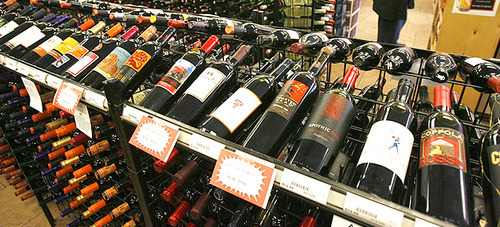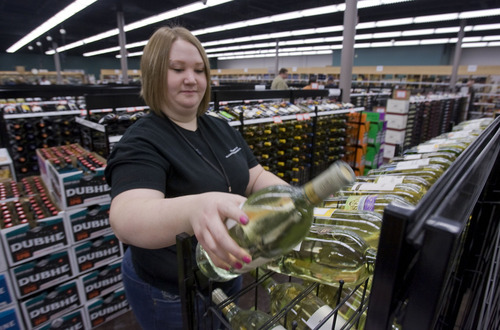This is an archived article that was published on sltrib.com in 2012, and information in the article may be outdated. It is provided only for personal research purposes and may not be reprinted.
In the aftermath of a scandal that led to the firing of the head of the state's liquor agency, legislators are proposing to tighten up oversight, give new authority to the state liquor commission and provide input for liquor outlets in rulemaking.
Absent from the proposals are any hint of privatizing liquor stores, a proposal put forward during the summer by Rep. Ryan Wilcox, R-Ogden, but scuttled weeks ago in the face of opposition from wary legislators and groups that feared it would drive Utahns to drink more.
"It has not gone away for good," Wilcox said. "There are some things that will be worked on. This is a starting point, not an end point."
Wilcox said that, in the future, the debate over privatization will be informed by a panel in the Department of Public Safety that would collect and analyze data and ensure liquor regulations are based on the science.
"It's a slow process that is baby step-by-baby step," Wilcox said. "Meanwhile, this does make changes that were needed in the department and puts us on a good footing to protect the public interest and the department itself."
The companion bills put forward by Wilcox and Sen. John Valentine on Wednesday would make almost no changes to the way consumers can buy alcohol at state stores, except for a tiny adjustment to the state's markup. The tweak to the markup would mean cheap booze could cost more while more expensive products could cost less.
Valentine's bill would revise the structure of the state's liquor commission, expanding it from five to seven members. The commission would be divided into two subcommittees — one to deal with compliance licensing, the other operations and procurement.
A new audit division would report directly to the commission, a response to a lack of oversight that culminated in a series of damning audits, including revelations that the former DABC director, Dennis Kellen, had steered $370,000 in contracts to his son's business, breaking up purchases to avoid competitive bidding.
Liquor commissioners would be appointed by the governor and confirmed by the Senate, as is now the case. The commission would nominate three candidates to serve as director of DABC and the governor would appoint one, who would serve for a four-year term.
"Now we have clear lines of responsibility," said Valentine. "We have clear lines of who reports to whom. We have a specific internal audit [committee] that will report directly to the commission."
Valentine said it was important to get the DABC governance ironed out before looking at substantive changes to the law.
Wilcox's bill would also give the Utah Tax Commission the job of collecting revenues from liquor sales. He said leaving that responsibility in DABC created a profit motive when their mission is meant to be liquor control.
"We don't feel comfortable that it should be the goal of the department to sell as much liquor as possible," Wilcox said. "We believe we had a conflict in design, the setup and structure of DABC from the beginning … One of those two would always win."
Senate Minority Leader Ross Romero, D-Salt Lake City, said the proposals are almost identical to the recent recommendations from a Democratic task force set up to study the issue.
"I'm very happy to see the changes we were recommending … are being adopted into the bill," Romero said.
Having the commissioner and executive director report to the governor and creating an advisory committee of licensees were both suggestions of the Democrats' panel.
But he said the bill doesn't do enough to address some of the restrictions on the purchase of alcohol that he said simply don't make sense.
He is sponsoring legislation to allow wine buyers to sample wines at locations other than the DABC warehouse. Another bill would allow drink specials at establishments, increase the number of liquor licenses available, and eliminate the so-called "Zion Curtain," requiring drinks to be prepared out of site of the public.
"As the sole and exclusive provider … the state needs to be careful not to overregulate or inappropriately limit" legal consumption, he said.
Valentine said the bills he and Wilcox were proposing were hammered out during weeks of negotiations with several interested parties, including the LDS Church, the Utah Restaurant Association, Utah Hospitality Association, beer wholesalers, the PTA, Mothers Against Drunk Driving and others.
Valentine said the LDS Church provided some input on the governance and were supportive of the audit division. "I would characterize their involvement as more of a listening and sounding board."
A lawsuit by the Hospitality Association alleges that the church had inappropriate control over liquor legislation that Valentine offered last year, which the association said imposes burdensome demands on the industry.
Melva Sine, president of the Utah Restaurant Association said the group is still dissecting the bill, but there are some positives. "We're happy with the advisory committee. We think it's good, because if industry has a concern now, who do you go to?" Sine said.
Questions remain, she said, about the new powers of the director, who will inherit a difficult job.
"We need a good director, someone who is going to work with low morale, there doesn't seem to be a lot of experience in the department now," Sine said. "They're going to have to build up the whole company … from the ground up."
In the House, Rep. Craig Frank, R-Pleasant Grove, is calling for a task force to take a look at privatizing the state's troubled alcohol monopoly.
Rep. Craig Frank, R-Cedar Hills, said he filed HB423 after several audits have shown that for many years the Utah Department of Alcoholic Beverage Control (DABC) has been incompetently managed.
"As more states have gone to the privatization model, it's time that Utah look at this too."
His HB423 proposes that a task force, made up of four state senators and five representatives, study privatizing the DABC. An appropriation of $27,000 would pay expenses for work expected to completed by Nov. 30.
Frank acknowledged that legislative leadership is not supporting his bill at this time. But he added that he has "significant support in the House, and I'll be drumming up support from leadership and other interested parties so we can have this discussion."
Dawn House contributed to this report.





